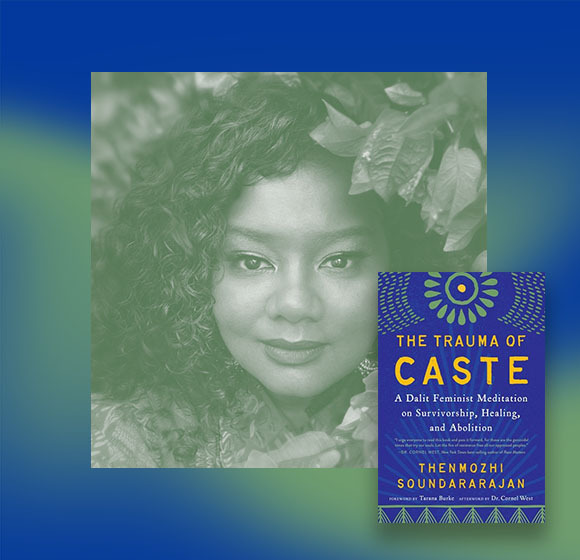“Like every major system of exclusion, caste has its interpersonal, individual, and structural manifestations. It’s the structural pieces of caste, where we see power consolidated at the top with dominant caste people, that we really want to concern ourselves with when we see the reorganization of power in tech companies around biases of caste and race.”
—Thenmozhi Soundararajan
The Trauma of Caste in Tech: In Conversation with Thenmozhi Soundararajan
Databite No. 154
Thenmozhi Soundararajan
Sareeta Amrute
Description
“‘Dalit’ is the name that we chose for ourselves when Brahminism declared us ‘untouchable.’ Dalit means broken. Broken by suffering. Broken by caste: the world’s oldest, longest-running dominator system…yet although ‘Dalit’ means broken, it also means resilient.”
Despite the ban on untouchability 70 years ago, caste, one of the oldest systems of exclusion in the world, is thriving — impacting 1.9 billion people worldwide. And the wreckages of caste are replicated in the US and elsewhere, showing up at work, at school, in housing, and in technology, and forcing countless Dalits to live in fear of being outed.
In The Trauma of Caste: A Dalit Feminist Meditation on Survivorship, Healing, and Abolition, Dalit American activist Thenmozhi Soundararajan puts forth a call to awaken and act, not just for readers in South Asia, but around the world. She ties Dalit oppression to fights for liberation among Black, Indigenous, Latinx, femme, and queer communities, examining caste from a feminist, abolitionist, and Dalit Buddhist perspective — and laying bare the grief, rage, and stolen futures enacted by Brahminical social structures.
In a book talk on March 21, Soundararajan joined Data & Society Principal Researcher Sareeta Amrute to discuss her incisive and urgent work, including critical questions about caste in technology.
Speaker
Thenmozhi Soundararajan | Twitter: @dalitdiva | Mastodon: @dalitdiva
Thenmozhi Soundararajan is a Dalit American artist, community organizer, technologist, and theorist. Currently, Thenmozhi is the Executive Director of Equality Labs, which she co-founded. Equality Labs is the largest Dalit civil rights organization working to empower caste-oppressed people in the US and globally. Through her work at Equality Labs, Thenmozhi has mobilized South Asian Americans towards dismantling eons-long systems of oppression, with the goal of ending caste apartheid, gender-based violence, white supremacy, and religious intolerance. Thenmozhi previously co-founded Third World Majority, an international media training organization and collective that supported people from disenfranchised groups in telling their own stories, in their own way.
Her intersectional, cross-pollinating work—research, education, art, activism, and digital security—helps to create a more generous, global, expansive, and inclusive definition of South Asian identity, along with safe spaces from which to honor the stories of these communities. Thenmozhi’s work has been recognized by the U.S. Congress, The Smithsonian Asian Pacific American Center, The Producers Guild of America Diversity Program, The Museum of Contemporary Art, The Sorbonne, Source Magazine, Utne Reader, The National Center for the Humanities, The National Science Foundation, The Ford Foundation, and The Alfred P. Sloan Foundation. She is a frequent contributor on issues related to South Asia, caste, gender, and racial Equity, as well interfaith issues and peace building, and has been featured in the New York Times, Washington Post, BBC, Guardian, ABC, and NBC news. She was also an inaugural fellow of the Robert Rauschenberg Artist as Activist, Atlantic Foundation for Racial Equity, and is a current fellow at Stanford Center for South Asian Studies. You can order her new book The Trauma of Caste from North Atlantic Books to learn more about her work around caste equity, abolition, and healing.
Host
Resources
References
- On bell hooks: Hua Hsu, “The Revolutionary Writing of bell hooks”, The New Yorker
- California sues CISCO: Paresh Dave, “California appeals court rules no arbitration in Cisco caste bias case”, Reuters
- “Caste in the United States: A Survey of Caste Among South Asian Americans”, Equality Labs
- Caste as a protected class in Seattle: The Associated Press, “Seattle becomes the first U.S. city to ban caste discrimination”, NPR
- On Seattle adding caste as a protected status, “Caste”, Seattle Office for Civil Rights
- Alphabet Workers Union
- Eduardo Duran, Healing the Soul Wound: Trauma-Informed Counseling for Indigenous Communities, Teachers College Press
- Tech Workers for Caste Equity on Substack
- Reflecting on intergenerational trauma from a South Korean perspective: Kathryn Lee, MHC, “Reflecting on Intergenerational Trauma and ‘Han’”, Intuitive Healing
- The scoop Thenmozhi teased at the end of the talk: Nitasha Tiku with David DiMolfetta, “Tech workers claimed caste bias. Now California could make it illegal.”, The Washington Post
Readings
- Thenmozhi Soundararajan, Equality Labs
- Murali Shanmugavelan, Critical Caste and Technology Studies
- Thenmozhi Soundararajan in conversation moderated by Tanuja Gupta, “A Conversation on Caste Equity in US Workplaces”, BigTech and News Media
- Kurt Schlosser, “In effort to ban caste discrimination, Seattle councilmember cites system’s link to tech industry”, GeekWire
Credits
Production: Tunika Onnekikami
Web Support: Alessa Erawan
Design: Gloria Mendoza
Editorial: Eryn Loeb
Additional support provided by Data & Society’s Engagement and Accounting teams.



